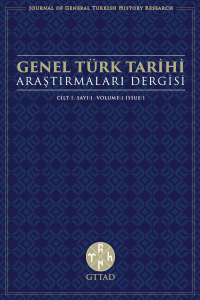FROM THE HISTORY OF NATIONAL-POLITICAL VALUES OF TURKESTAN JADIDES
Makalede Ceditçlik hareketinin toplumun aydınlanması hem de ilmi ve eğitimsel yönden modernleşmesine katkıda bulunan birer tarihi fenomen olduğu incelenmektedir. Aydınların bu manevi ve ruhani inisyatifi “zekasal ve kültürel herakat”, “zekasal uyanış” olarak Müslümanların Avrupa külütüyle yakınlaşarak fikri yönden gelişme ve dönemin ihtiyaçlarından yola çıkarak toplum hayatını yeniden kurmaya yönledendirilmişti. Bu dönemde eğitimin geliştirilmesi Müslümanların eğitim alanında yenilikçi, yatırımcı ve etkin bir toplum olmasını sağlamıştır. Bilindiği gibi, 19. yüzyılın sonu – 20. yüzyılların başlarında gelişen Türkistan Ceditçilik hareketinin amacı Çar Rusyası’nın boyunduruğu altında bulunan ülkeyi eğitim yoluyla bağımsızlığa kavuşturmaktı. Türkistan Ceditlerinin esas çoğunluğu milli ve dini değerleri korumakla birlikte Batı’nın, özellikle Avrupa ve Rusya’nın gelişmiş eğitim, sanayi ve teknoloji bilimlerinden yararlanarak Türkistan’da refahı sağlamaktı. Bu dönemde Münevver Karı, Mahmud Hoca Behbudi, Abdurauf Fıtrat, Abdülhamid Çolpan, Abdulla Avlani, Mustafa Çokay, Turar Riskulov, Kaygısız Atabayev gibi Türkistanlı birçok Özbek, Kazak, Türkmen ve d. aydın ve ileri gelenler Avrupa kültürüyle yakından tanışmayı ve milli değerleri koruyarak modern bir Türkistan kurmayı hedefliyorlardı. Bu amaçla Ceditler Türkistan’ın Taşkent, Çimkent, Semerkant, Buhara, Hive, Çarcüy, Aşgabat ve d. şehirlerine onlarca Cedit okulları açmışlardır. Adı geçen okullarda Türkistanlı gençler sadece geleneksel Arap ve Fars dillerinde eğitim almakla kalmayıp, kendi ana dillerinde ve Rusça eğitim sağlanması öngörülmekteydi. Bu dönemde Türkistan’da geleneksel Müslüman eğitimiyle Cedit okulları arasında çekişmeler de boy gösterdiği söz konusudur. Ceditlerin bir bölümü her ikisinin arasını bulmayı hedeflemişlerdir.
Anahtar Kelimeler:
Ceditler, Türkistan aydınları, eğitim reförmleri, modernleşme, Cedit okulları
FROM THE HISTORY OF NATIONAL - POLITICAL VALUES OF TURKESTAN JADIDES
The article examines that the Jadidizm movement is a historical phenomenon that contributes to the enlightenment of society as well as the modernization of science and education. This spiritual initiative of the intellectuals was directed to re-establish the social life based on the intellectual development and the objectives of those times by getting closer to the European culture as “mental and cultural heredity” and “mental awakening”. Reforms of education in this period maintained novelty and strong impact on the overall development of Central Asian society.As it is known, the goal of the Turkestan Jadidism movement, which developed in the late 19th and early 20th centuries, was to bring independence to the country under the power of Tsar Russia through education. The main majority of Turkestan Jadids were to protect the national and religious values, but to ensure prosperity in Turkestan by benefiting from the advanced education, industrial and technological sciences of the Western world, especially Europe and Russia. During this period, Munawwar Kari, Mahmud Hodja Behbudi, Abdurauf Fitrat, Abdulhamid Cholpan, Abdulla Avlani, Mustafa Cokay, Turar Riskulov, Kaygisiz Atabayev such as many Uzbek, Kazakh, Turkmen intellectuals and notables aimed to get acquainted with European culture and to establish a modern Turkestan while preserving national values. For this purpose, the Jadids of Turkestan have opened dozens schools in cities such as Tashkent, Shymkent, Samarkand, Bukhara, Khiva, Charjou, Ashgabat. In these schools, young people from Turkestan were not only taught in the traditional Arabic and Persian languages, but also in their native language and Russian. During this period, there were also conflicts between the traditional Muslim education and the Jadid schools in Turkestan. Some of the Jadids aimed to stay in between the two.
___
- ABDULLAEV, Ravshan Madjidovich. "Integratsionnie processi v musulmanskom mire i turkestanskie jadidi." Evraziiskoe obschestvo: ekonomika, politika, bezopasnost, 1997: 123,132.
- ABDULLAEV, Ravshan Madjidovich. "Iz istorii natsionalnogo dvizhenia v Turkestane posle fevralia 1917 goda." Social sciences of Uzbekistan (Об), 1993: 49-53.
- ABDULLAEV, Ravshan Madjidovich. "Turkestanskie progressisti i natsionalnoe dvijenie." Zvezda Vostoka, 1992: 106-113.
- ALIMOVA, Dilaram Agzamovna, and Dilbar Rashidova. Makhmudkhodja Bekhbudi i ego istoricheskie vozzrenia . Edited by B Kasimov. Tashkent: Manaviyat, 1998.
- ALIMOVA, Dilaram Agzamovna. Istoricheskoe mirovozzrenie jadidov i ih proektsia bedeschego Turkestana . Tashkent: Fan, 1996.
- ANDREEV, G. "Samarkandskii jurnal "Oina" i yego redaktor-izdatel Makhmud Khodja Bekhbudi." Turkestanskie vedomosti, September 17, 1915.
- BASIROV, A Kh. "Religioznaia moral Srednevekovia i printsipi gumanizma v jadidisme." Vestnik Bashkirskogo Universiteta, Ufa 2008, p. 372-376.
- BOBROVNIKOV, N A. "Russko-tuzemnie uchilischa, mektebi i medresi Srednei Azii." Jurnal Ministerstva narodnogo prosveschenia, Tashkent 1913.
- GAFAROV, Numandjon Usmandjonovich. Obschestvenno-politicheskaya deiatelnost Makhmudkhodja Bekhbudi, Dushanbe: Sino, 1997.
- GANKEVICH, Viktor. Na sluzhbe pravde i prosveschenia. Kratkiy biographichesky ocherk Ismaila Gasprinskogo. Simferopol: Dolia, 2000.
- KOTYUKOVA, T. V. Okraina na osobom polozhenii... Turkestan v preddverii dramy, М: Nauchno-politicheskaya книга, 2016.
- VAKHIDOV, H P. "Osobennosti prosvetitelstva v Srednei Azii i svobodomyslie", Iz istorii obschestvenno-philosophskoi mysli i volnodumia v Srednei Azii, by H P Vakhidov. Tashkent: Fan, 1991.
- Yayın Aralığı: Yılda 2 Sayı
- Başlangıç: 2019
- Yayıncı: Özgür Türker
Sayıdaki Diğer Makaleler
FROM THE HISTORY OF NATIONAL-POLITICAL VALUES OF TURKESTAN JADIDES
TÜRK TARİHİNİN KAYNAKLARI: ALTAY’DA HUN MADDİ KÜLTÜRÜNÜN ARKEOLOJİK KAYNAKLARINA GENEL BİR BAKIŞ
RUS VE OSMANLI KAYNAKLARINA GÖRE OSMANLI DEVLETİ'NİN 1569 ASTARHAN SEFERİ
KIRIMLI DEVLET SULTAN HANIM’IN MUHALLEFATI (17. YÜZYILIN İKİNCİ YARISI)
RUS VE OSMANLI KAYNAKLARINA GÖRE OSMANLI DEVLETİ'NİN 1569 ASTARHAN SEFERİ
ALTIN ORDA’DAKİ KENT MERKEZLERİNİN GELİŞİMİ VE ÜKEK ŞEHRİ
UMUT YOLSEVER, ULİ SCHAMILOGLU
JİN SHU’DAKİ BİLGİLER IŞIĞINDA MS 3.YÜZYILDA HUNLARA (XİONG-NU) GENEL BİR BAKIŞ
MODERN DEDE KORKUT: MUSTAFA KAFALI
HOCAM MUSTAFA K. KAFALI’DAN (1934-2019) 1960'LARDAN HATIRALAR
